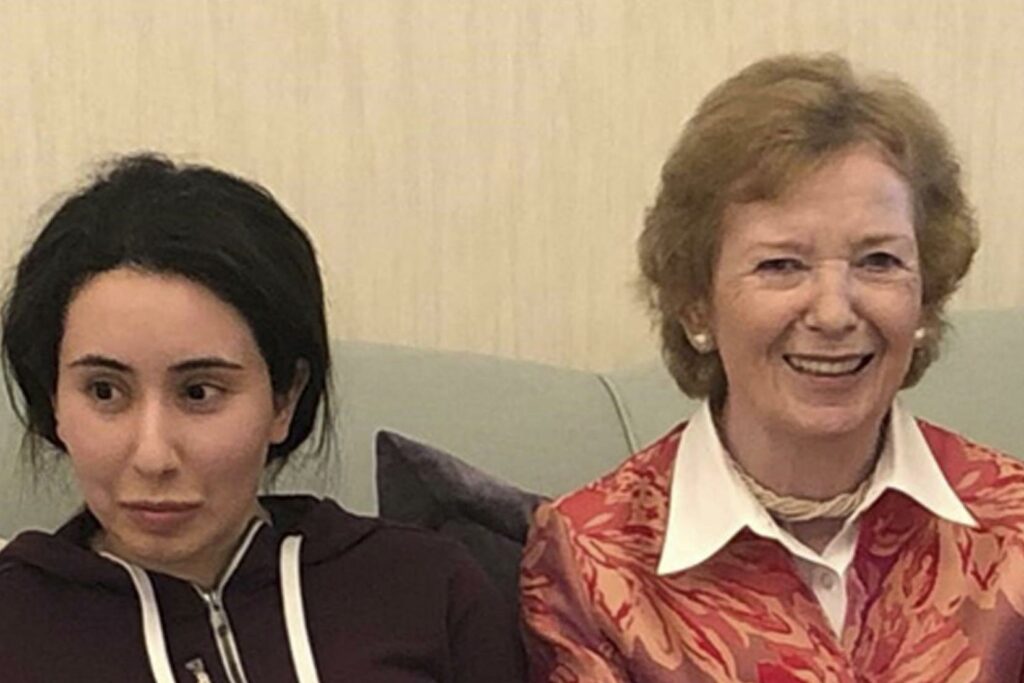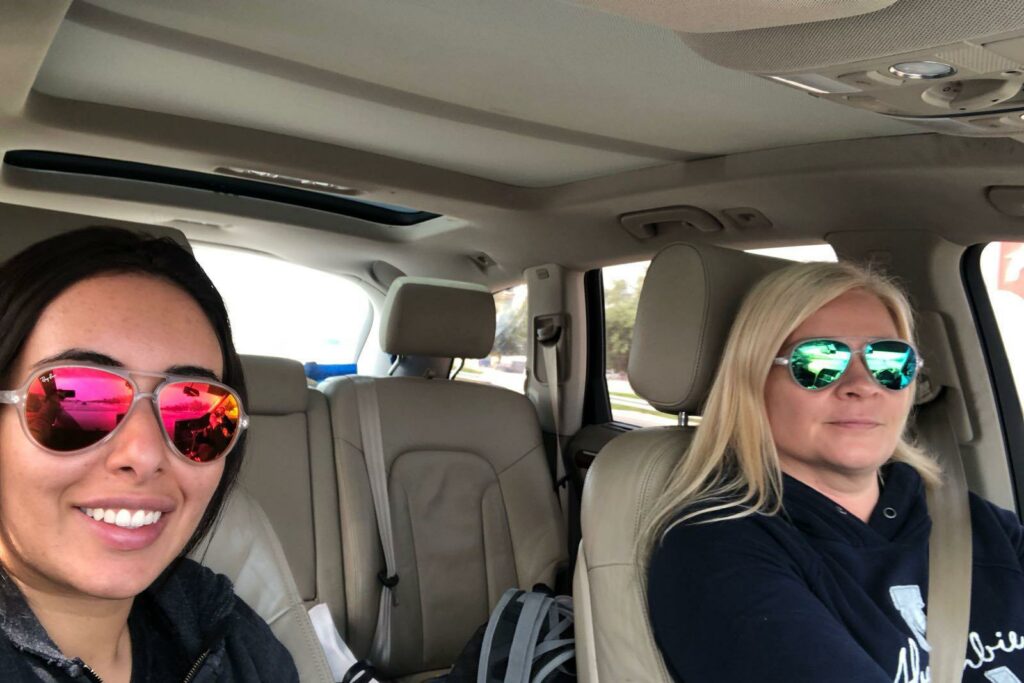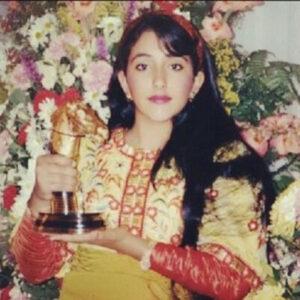David Brown
February 17, 2021, The Times
The daughter of the billionaire ruler of Dubai has accused him of keeping her hostage after she was abducted from a yacht during an escape attempt.
In a series of secretly recorded videos Princess Latifa bint Mohammed al-Maktoum claims to have been threatened with being shot unless she co-operates with official statements issued by her father.
Sheikh Mohammed bin Rashid al-Maktoum is close to the Queen because of their shared love of horse-racing and is an influential ally of Britain in the Middle East. A UK court ruled last year that he abducted Latifa and her sister Princess Shamsa. The Times reported after the ruling that the Queen was to distance herself from the sheikh and avoid being photographed beside him.
Latifa’s videos, which are being handed to the United Nations, were recorded in the bathroom of a villa close to a beach in the tourist destination. They were taken on a phone she was given about a year after her failed attempt to escape Dubai in 2018.
“This villa has been converted into a jail,” she says in one recording. “All the windows are barred shut. There’s five policemen outside and two policewomen inside. I can’t even go out to get fresh air. So basically, I’m a hostage.”
Lawyers for the princess said last night that they were preparing action to force the British government to impose sanctions against the sheikh.
Rodney Dixon, QC, who presented Latifa’s case to the UN, urged ministers to use Britain’s “close relationship” with the United Arab Emirates to seek the princess’s immediate release. He added that the government had a special responsibility to deploy its human rights sanctions regime, including potential asset freezes and travel bans, to put pressure on Sheikh Mohammed. He is the absolute ruler of Dubai and the prime minister and vice-president of the United Arab Emirates.
“The UK government has so far never taken any action against the UAE authorities,” Dixon told The Times. “They could certainly at least look to condemn this in strong terms and then look to take action through the imposition of sanctions. If they don’t do so we will be looking to make the application to them to do that on behalf of the princess.” He added that without the threat of sanctions “the status quo is going to remain and that’s very dangerous for her”.
The UN’s working group on enforced or involuntary disappearances last month included Latifa on its list of cases for the first time.
Dixon said he expected the new evidence to accelerate the princess’s case to the UN Human Rights Council in Geneva where countries, including Britain, would be called on to vote on a resolution demanding she be freed.
The Foreign Office said: “This is a concerning case. While it is not one the UK is directly involved in, we will follow any developments closely. We routinely raise human rights issues with other countries, including the UAE.”
Dominic Raab, the foreign secretary, told Sky News today: “You can only watch the footage shown and see that there is very distressing pictures, a very difficult case. I think it is concerning. We have seen that the United Nations High Commissioner on Human Rights will be following up on what we have seen and we’ll be watching and monitoring that very closely indeed.”

In the recordings, broadcast by BBC Panorama last night, the princess condemned the former UN human rights envoy Mary Robinson for taking part in what Latifa referred to as a publicity stunt in 2018 in which she claimed that the princess was being cared for by a “loving family”.
Robinson claimed that she had been “horribly tricked” when she met Princess Latifa ten months after the abduction. She was photographed sitting next to Latifa and told BBC Radio 4 that the princess was a “troubled young woman” who regretted planning the escape. Nine days after the meeting the foreign ministry of the United Arab Emirates published photographs of the pair as proof that the Latifa was safe and well. Latifa has now described how her stepmother, Princess Haya bint al-Hussein of Jordan, 46, said that she was being allowed out as a “test” to see if she could behave.
Robinson claimed she did not ask Latifa about her situation during the publicity visit in December 2018 because she did not want to “increase the trauma” of Latifa’s “condition”. She claimed that she had been misled into believing that Latifa had bipolar disorder and was traumatised by the escape attempt.
Robinson, 76, told Panorama: “I was particularly tricked when the photographs went public. That was a total surprise. . . I was absolutely stunned. . . I was misled, initially by my good friend princess Haya, because she was misled.
“Haya began to explain that Latifa had quite a serious bipolar problem. And they were saying to me, in a way that was very convincing: ‘We don’t want Latifa to go through any further trauma’ . . . I didn’t know how to address somebody who was bipolar about their trauma. And I didn’t really actually want to talk to her and increase the trauma over a nice lunch.”
In videos recorded at the villa Latifa condemned Robinson. “She said that I was a troubled young woman and I had a serious medical condition and I was getting help for it,” she said. “That’s implying that I have psychiatric problems. She knew that I was okay. She lied and it was all a set-up.”
Robinson has now called for international action to establish Latifa’s condition and whereabouts. “I continue to be very worried about Latifa,” she said. “I think it should be investigated.”
In the videos the princess gives her first account of the 2018 escape attempt and subsequent imprisonment, and tells of her torment at not knowing if she will ever be freed.
After being smuggled from one of her father’s places, Latifa used an inflatable boat and jet ski to reach international waters where Hervé Jaubert, 64, a former French navy captain and spy, was waiting in a US-flagged yacht. Eight days later, off the coast of Goa, western India, the yacht was boarded by commandos who used smoke grenades to force Latifa out of hiding.

Latifa was not prepared to give up her chance of freedom without a fight. In one of the videos, she describes “kicking and fighting” the heavily-armed soldiers, biting the arm of one of them until he screamed. “I kept saying you can’t take me back,” she said. “I want asylum and we’re in international waters. You can’t kidnap me. They were just on a mission.”
Latifa said that her hands were zip-tied and she was given a tranquilliser. “They put me on a stretcher,” she said. “As they were carrying me up the steps of a private jet is when I passed out.”
The princess did not regain consciousness until the private jet landed back in Dubai. Before her escape attempt, Latifa had recorded another video in which she predicted: “If you are watching this video, it’s not such a good thing, either I’m dead or I’m in a very, very, very bad situation.”
The videos recorded the following year appear to prove her premonition was correct. They show her looking gaunt and hunched in the corner of a bathroom, her eyes darting nervously around the room as she records herself on a mobile telephone.
“I am doing this video from a bathroom because it is the only room with a door I can lock,” she said. “I’m in a villa. I’m a hostage and this villa has been converted into a jail. All the windows are barred shut, I can’t open any window. There’s five policemen outside and two policewomen inside the house. I can’t even go outside to get fresh air.”
Latifa, one of the sheikh’s 30 children by six wives, claims that she has been threatened with being shot unless she co-operates with the statements issued by her father. The villa where she was kept is close to a beach in the tourist destination and guarded around the clock by a team of 30 police officers.
The videos have been provided by Tiina Jauhiainen, 43, the princess’s instructor in the Brazilian martial art of capoeira who helped with the thwarted escape. Latifa’s friends hope that making videos public will bring international pressure on Dubai.
In one video she says: “I have been here ever since, for more than a year in solitary confinement. No access to medical help, no trial, no charge, nothing . . . Every day I am worried about my safety. The police threaten me that I will never see the sun again. I am not safe here.”
The princess expresses her fears about being held captive without access to legal assistance. “I’m a hostage,” she said. “I am prisoned in this jail. My life is not in my hands.”
In another she said: “I don’t know when I will be released and what the conditions will be like when I am released. Every day I am worried about my safety and my life, don’t really know if I am going to survive the situation.”
The princess is being held in one of the many properties owned by her father, who as well as being the ruler of Dubai is also prime minister and vice-president of the United Arab Emirates.
Latifa said: “I am really reaching the point now where I am just getting so tired of everything. I don’t want to be a hostage in this jail villa, I just want to be free. I don’t know what they are planning to do with me, I really don’t know. The situation is getting more desperate every day and I am just really, really tired of this now.”
Latifa first tried to escape at the age of 16 when she crossed into Oman. She was swiftly brought back to Dubai where she was locked up for three years and four months.
The princess said that she was kept in solitary confinement and that “even when they weren’t physically beating me up, they were torturing me”.

Her abduction has parallels with the kidnapping of her sister, Princess Shamsa, who escaped from their father’s British mansion.
She fled from the Longcross estate near Cobham, Surrey, where the extended family spent their holidays in August 2000. She moved into a hostel in south London and stayed with friends in Cambridge.
Shamsa said that she was abducted by four armed men and taken to her father’s 3,300-acre Dalham Hall estate in Suffolk, which includes his celebrated Godolphin racing stables.
In emails to a British lawyer she said: “There they gave me two injections and a handful of tablets. The very next morning a helicopter came and flew me to the plane, which took me back to Dubai. I am locked up until today.”
The only evidence about Shamsa’s condition is a home video that was recorded in 2018 by Latifa. Both princesses are daughters of Houria Ahmed Lamara.
Princess Latifa said that Shamsa was being “confined to one room and constantly supervised by nurses and a psychiatrist” while being given medications which she believed were designed “to control her mind”.
Sheikh Mohammed told the family division of the High Court in London in a witness statement last year that there was “reason to believe that Latifa had been manipulated” and “to this day I consider that Latifa’s return to Dubai was a rescue mission”.
He said that he had organised a search for Princess Shamsa because she was more “vulnerable than other young women of her age because her status made her a kidnap risk”.
The sheikh said that he had asked both Latifa and Shamsa in August 2019 if either wanted to speak to British lawyers but they declined.
The court battle began after the ruler’s former wife, Princess Haya bint al-Hussein, fled to her £75 million mansion in west London with his two youngest children that year.
The Times revealed that the sheikh had became concerned at her closeness to her bodyguard, a married former British Army officer who was later named as Russell Flowers, 36. The sheikh started legal action to secure the return of his daughter, Jalila, now 12, and son Zayed, seven, to Dubai.
Princess Haya, 45, a half-sister of King Abdullah of Jordan, opposed their return and said she feared that the sheikh was negotiating to marry Jalila to Crown Prince Mohammed bin Salman of Saudi Arabia. She said she was worried that Sheikh Mohammed would order the kidnapping of their children as he had two of their older half-sisters.
Sir Andrew McFarlane, president of the family vision of the High Court, said: “The allegations that the father ordered and orchestrated the kidnap and rendition to Dubai of his daughters Shamsa and Latifa are of a very high order of seriousness. They may well involve findings, albeit on the civil standard, of behaviour which is contrary to the criminal law of England and Wales, international law, international maritime law and internationally accepted human rights norms.”
The judge found the allegations that the sheikh had abducted the princesses were proved.